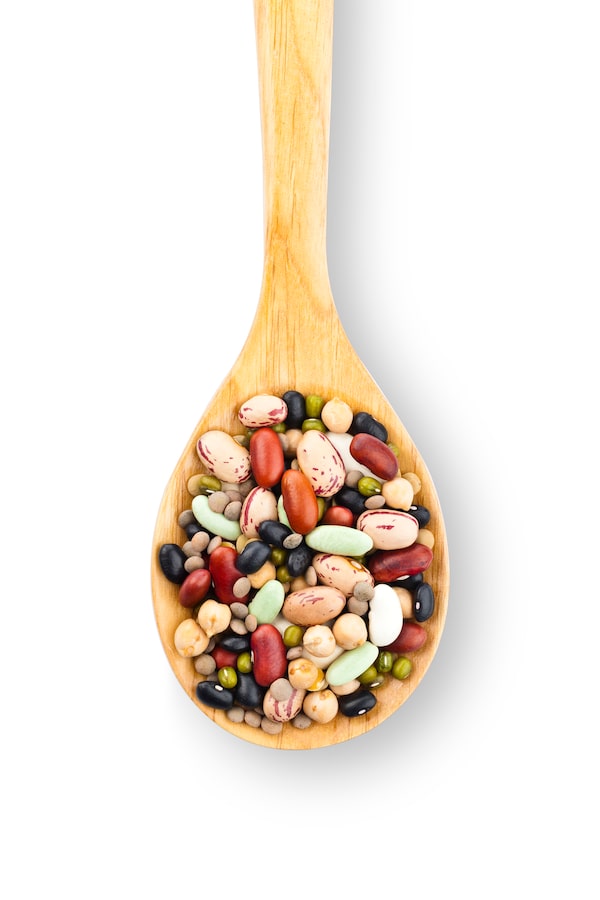
Eating bean-based meals at least four times a week is associated with lower blood pressure and cholesterol levels and protection against cardiovascular disease, Type 2 diabetes and prostate cancer.Elena Elisseeva/iStockPhoto / Getty Images
Q: My family has been having more bean-heavy meals in an effort to eat less meat. But the gas from eating beans is uncomfortable and unpleasant! Is this normal? Are we eating too many beans? Is there a way to continue eating beans but not experience gas?
If you’re reducing your meat intake for health reasons or ethical considerations, pulses (e.g., kidney beans, black beans, chickpeas, lentils) are nutrient-packed protein alternatives. They do, however, have a downside for some people: excess flatulence.
That doesn’t mean that you have to stop eating beans. There are steps you can take to reduce – even eliminate – the digestive discomfort they cause.
On the nutrition front, beans and lentils have a lot going for them. Besides plant protein, they’re exceptional sources of fibre, blood-sugar-regulating magnesium and folate, a B vitamin that makes and repairs DNA in cells.
Eating bean-based meals at least four times a week is associated with lower blood pressure and cholesterol levels and protection against cardiovascular disease, Type 2 diabetes and prostate cancer.
Getting back to the gas problem, though.
Why do beans cause gas?
First, passing gas is a normal part of the digestive process; it’s a sign that your digestive tract is doing what it’s supposed to do. Studies have reported that a healthy person passes gas an average of 14 times a day, and some people do so up to 22 times daily.
The main cause of gas is fermentation of undigested carbohydrates by normal gut bacteria. Some foods, especially pulses, can increase the body’s usual gas production.
Beans and lentils contain high amounts of complex carbohydrates called oligosaccharides, sugars that the body can’t digest because it lacks the enzyme to break them down in the small intestine. Once these undigested sugars end up in the large intestine, resident bacteria ferment them causing gas that gets released as flatulence.
But there is a upside to this fermentation. Much of the undigestible carbohydrates in beans are prebiotic, meaning they fuel the growth of beneficial gut bacteria, microbes thought to aid in immunity and play a role in preventing allergies, Type 2 diabetes, obesity and inflammatory bowel disease.
How exercise may help keep food cravings in check
Study suggests the new Canada’s Food Guide is more affordable only under specific conditions
Sugar-free? Unsweetened? No added sugar? How to decode sugar labels

Not all types of pulses increase gas equally. If one bean bothers you, try a different one to see if it causes less gas. Lentils, split peas and black-eyed peas, for example, are lower in gas-producing carbohydrates than other pulses.iStockPhoto / Getty Images
Practice the following tips to continue enjoying beans without the excess gas. (Some people with irritable bowel syndrome, however, will continue to be sensitive to oligosaccharides in beans.)
Soak, drain, rinse
If you cook dried beans from scratch, soak them in plain water for 12 hours or overnight to reduce the amount of gas-producing sugars. Soaking twice can reduce the sugars further.
Drain the soaking water and use fresh water to cook the beans. If you use an Instant Pot to cook dried beans, soak them first to reduce their gas potential.
Rinse canned beans in a colander under running water to remove oligosaccharides (and sodium) that’s in the liquid.
Start small, go steady
If you’re new to beans, start by eating a small serving of beans (one-quarter to one-half cup) to prevent your gut microbes going into fermentation overdrive.
Eating beans every day builds up the population of gut bacteria that can digest their carbohydrates. As the community of bacteria in your gut shifts, it will adapt to regularly incoming oligosaccharides and you’ll produce less gas.
A 2011 study found that among participants who experienced increased gas after eating one-half cup of beans daily for one week, 70 per cent reported that their gas returned to normal after two to three weeks of eating beans.
Try different types
Not all types of pulses increase gas equally. If one bean bothers you, try a different one to see if it causes less gas.
Lentils, split peas and black-eyed peas, for example, are lower in gas-producing carbohydrates than other pulses. Chickpeas and navy beans are on the high end.
Chew thoroughly
Chewing food stimulates your salivary glands to release amylase, an enzyme which beings the process of breaking down carbohydrates. Chewing food well can help limit gas production in the intestine.
Eating slowly can also prevent you from swallowing extra air, which can contribute to flatulence.
Adjust your recipe
Beans aren’t the only foods that can cause intestinal gas. Many different vegetables including asparagus, broccoli, cauliflower, celery, Brussels sprouts, mushrooms, green peas, garlic and onions can also make you gassy.
Too many gas-producing ingredients in one meal can cause excessive and uncomfortable gas.
Try a digestive enzyme
If all else fails, you can try a supplement that contains the digestive enzyme (alpha-galactosidase) that breaks down oligosaccharides. Beano is a popular brand available in drug stores.
Leslie Beck is a dietitian.